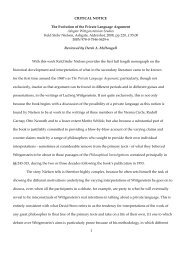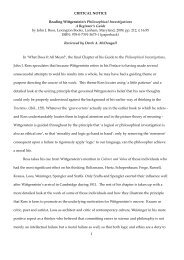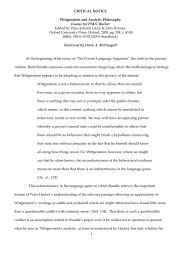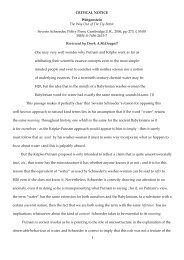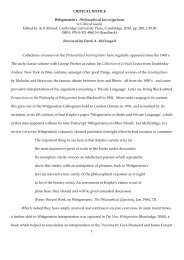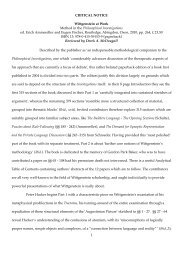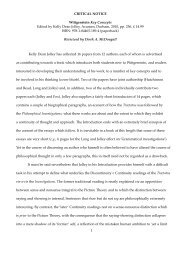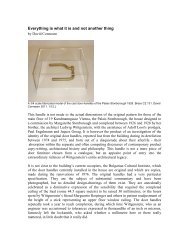CRITICAL NOTICE The Enchantment of Words Wittgenstein's ...
CRITICAL NOTICE The Enchantment of Words Wittgenstein's ...
CRITICAL NOTICE The Enchantment of Words Wittgenstein's ...
You also want an ePaper? Increase the reach of your titles
YUMPU automatically turns print PDFs into web optimized ePapers that Google loves.
emarks on the ethical may help us understand what he says about the mystical. Yet McManus’s<br />
account <strong>of</strong> ethics in Chapter 13, ‘Ethics and “the Inexpressible”‘ and in Chapter 14, ‘Ethics and<br />
“the Ladder”’ contains some <strong>of</strong> the most difficult material in the book, sometimes difficult in its<br />
own right and sometimes difficult because it is hard to see how it relates to Wittgenstein. This<br />
justifies his initial remarks before launching his account:<br />
<strong>The</strong> evidence upon which any commentator can draw in trying to<br />
make sense <strong>of</strong> Wittgenstein’s comments on ethics is sparse. <strong>The</strong>se<br />
comments are few and far between; this is one <strong>of</strong> the reasons why<br />
they are so puzzling - they seem to come out <strong>of</strong> nowhere - and are<br />
so easy for commentators to disregard. As a result <strong>of</strong> this insubstantial<br />
basis, any reading <strong>of</strong> Wittgenstein’s remarks on ethics will be speculative;<br />
and anyone unable to entertain such a reading will simply have to suspend<br />
judgement on what these remarks mean (Ibid., 177).<br />
Yet this precedes an account in which the ‘inexpressibility’ <strong>of</strong> ethics is related to the<br />
notions <strong>of</strong> decency, conscience and goodwill, as background ‘capacities’ without which ethical<br />
talk lacks substance, yet which cannot themselves be ‘condensed’ into ethical principles to be<br />
conventionally followed. As in his account <strong>of</strong> ‘internal relations’, there is a distortion involved in<br />
a first recogniton <strong>of</strong> these phenomena, a ladder to be ‘thrown away’ as the philosopher comes to<br />
appreciate his misguided view <strong>of</strong> ethics for the fantasy that it is (Ibid.).<br />
Whilst the complexities <strong>of</strong> McManus’s treatment <strong>of</strong> ethics with its speculative character make<br />
this subject very difficult to adequately consider in the present context, at one point in his discussion<br />
he raises a question that points towards one <strong>of</strong> the most important treatments in his book. <strong>The</strong> question<br />
he raises (Ibid., 179) is whether the logical like the ethical might be unteachable, and this takes him back<br />
to his previous discussion <strong>of</strong> the apparent impossibility <strong>of</strong> teaching or learning symbols. This subject<br />
is important because it relates directly to the process <strong>of</strong> teaching or learning a first language, and here<br />
McManus once again repeats the apparent difficulty to which this idea gives rise:<br />
14



